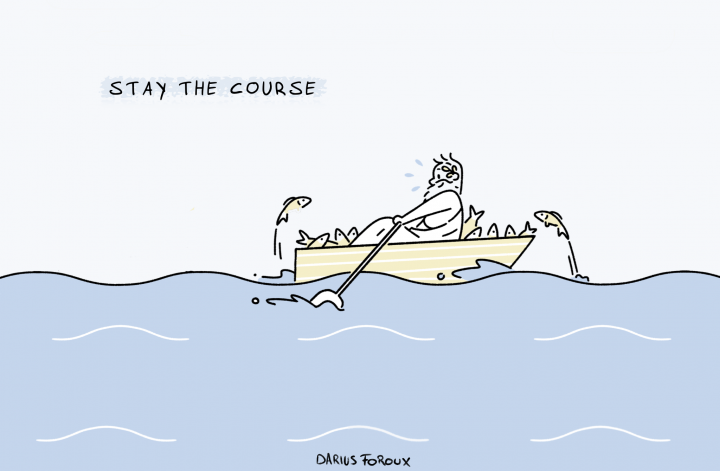Investing in the stock market is dangerous. How do you invest wisely when there are so many investing and market pitfalls that take away investors’ money?
It’s like the Brothers Grimm fairytale about the seven poor little goats. In case you forgot or never heard it, here it goes.
Once upon a time, there was a family of seven little goats who lived in the forest. One day, their mother left to go shopping and when she was gone, a wolf appeared at the door looking for dinner.
He tricked the seven little goats into letting him inside, which they of course did because he disguised himself and talked nicely to them.
When the goats let him in, he ate them all. Except for one little goat who managed to hide.
The mother came back and found the little one, but the others (including the wolf) were gone.
She was furious and determined to take down this wicked wolf. She hunted him down and used a pair of scissors to cut the wolf’s belly open, and the six children jumped out miraculously unharmed.
This story has a happy ending. But when big bad wolves trick us into giving them our money, we don’t see that money again.
In this article I’ll share 4 principles you must be aware of if you want to avoid financial wolves.
Principle #1: Education
Investing is not as simple as, “buy low and sell high.” I bought my first stocks when I was 17, and almost 19 years later, I’m still learning new things about investing. Now, you don’t need to know everything before you start.
But you do need a basic understanding of finance, investing, and public markets. Otherwise, you end up harming your own potential to build wealth. The grandfather of modern-day investing, Benjamin Graham, said:
“The investor’s chief problem — even his worst enemy — is likely to be himself.”
This is the most important lesson for an investor. The biggest pitfall in the market is that you have no clue what you’re doing.
That’s why financial education is the most important thing, not only for beginners but even for experienced investors.
The way I look at it, I deserve to lose my money if I don’t know what I’m doing. Every time I make a rash decision (with my money or in other areas of my life) I end up losing time or money.
At the moment, I get upset. But when I reflect on my loss, I always say, “You deserved that. Simply educate yourself more and avoid these dumb mistakes.”
This mindset sounds harsh but it will truly help you to avoid common pitfalls. If you don’t know where to start, I have a short online course that covers the basics of investing.
If you prefer reading books, check out my list of books I recommend to improve your financial literacy.
Principle #2: Skepticism
Howard Marks, one of my favorite investors, said this about skepticism in his memo called “Something of value”1Source: Oak Tree Capital:
“Skepticism is important for any investor; it’s always essential to challenge assumptions, avoid herd mentality and think independently. Skepticism keeps investors safe and helps them avoid things that are “too good to be true.”
As someone who’s naturally skeptical, I love this mentality. And I think it’s critical for every person who wants to invest.
When it comes to investing, you especially don’t want to trust people who give you specific investing tips like; buy company x or this cryptocurrency or a piece of land they grow cannabis on (I really heard this one a while back, not making it up).
There are no silver bullets in investing or wealth building. There’s no such thing as guaranteed returns.
But you know what there’s a lot of? Scammers and charlatans. So always remain skeptical. But you also don’t want to take it too far that you become someone who’s close-minded.
I trust people who share information and knowledge for educational purposes, not to sell their investment ideas. You still want to keep learning and be open to new ideas. As Marks warned:
“While it’s important not to lose your skepticism, it’s also very important in this new world to be curious, look deeply into things and seek to truly understand them from the bottom up, rather than dismissing them out of hand.”
Principle #3: Caution
This principle is related to the previous one, but it’s different. Caution in the markets means investing with small amounts and building up your investments slowly.
If you have a lump of money, you really don’t have to invest everything straight away. You don’t even have to do it in the same month.
Let’s say you saved $10K and you want to start investing in an S&P500 index fund, which is generally considered a solid way of getting exposure to US stocks.
I would invest $2K a month over the next five months. If I go all in on day one, I keep looking at the price. And if I happen to start at all-time highs, the odds of my investment going down are high.
So I’d rather average myself into the market over a few months. One month I get in at a higher price than the other. But so what? There’s no way you can always get in at the lowest price.
No matter the level of risk you take with an investment, always proceed with caution.
Never (ever) put your entire net worth into a single investment. Sure, you might hit it big. But the downside is just too risky to sleep peacefully at night.
Principle #4: Consistency
As Peter Lynch, the former mutual fund manager of Magellan at Fidelity, and the author of One Up on Wall Street said:
“Thousands of experts study overbought indicators, head-and-shoulder patterns, put-call ratios, the Fed’s policy on money supply…and they can’t predict markets with any useful consistency, any more than the gizzard squeezers could tell the Roman emperors when the Huns would attack.”
Investing is not about what type of strategy you follow. What matters is picking a winning strategy you can stick to.
Forget about timing the market or becoming a day trader. Unless you work in finance, your job is not to earn a living by getting involved in the world of investing on a daily basis.
Set and forget.
That’s the strategy you and I can sustainably follow for our entire careers.
The best investment returns are achieved by investing small sums of money for a long time.
A small amount can turn into a big amount that way. But you need time on your side. I’m talking decades.
And you can only accomplish that if you’re educated, skeptical, cautious, and consistent.




